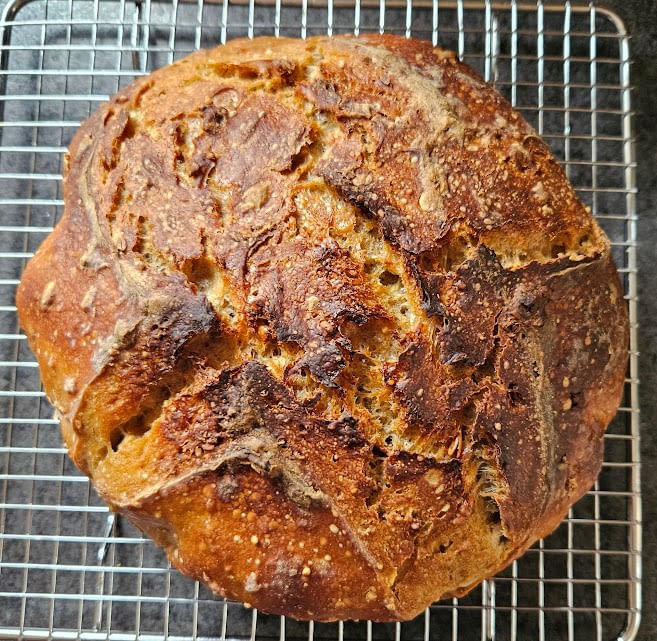Baking Sourdough Daily: My Meditation and Healthy Food

Sourdough and My Wellbeing Routine
Sometimes the world feels overwhelming, so finding moments of calm and connection has become essential for me. Surprisingly, I’ve found peace and joy in the most unexpected place: sourdough baking. What started as simple curiosity has turned into a routine that nourishes both my body and mind.
Curiosity
Years ago, I discovered sourdough at a friend’s house and realized it didn’t upset my digestion like other breads. After moving back to the UK and settling into a new home, I decided to try making my own bread—a welcome distraction from unpacking boxes.
Humble Beginnings
Creating a sourdough starter with just flour, water, and patience became an unexpected lesson in mindfulness. Watching it bubble to life was fascinating.
Baking: Science and Creativity
When I baked my first loaf, I was full of expectations. I had followed the recipe, yet the results fell short of my hopes—not a disaster, but not the wonderful loaf I had imagined. A bit of research taught me that different brands of flour have different properties. That’s when the creativity began.
I experimented with various flours, combinations, and processes until I finally baked a loaf I loved. One delightful aspect of sourdough is that it uses the “stretch and fold” method instead of kneading, giving me a chance to work with my hands. After a day of rising, the dough is shaped and left to rest overnight in the fridge.
A Daily Ritual
My morning starts with preheating the oven along with my “Dutch oven”—a cast-iron casserole pot I had nearly donated. After about 15 minutes, it’s time to score the loaf and pop it in. The house fills with the wonderful smell of baking bread.
While the oven warms, I prepare food for my 19-year-old cat. As the bread bakes, I usually enjoy my own breakfast. Each loaf is different and unique, a great reminder to celebrate progress rather than perfection. For me, the joy lies in the process itself.
Beyond Bread
Maintaining a sourdough starter is like nurturing a relationship—regular care keeps it strong. Daily baking led me to share loaves with family and friends, sparking engaging conversations. I even held a teaching session for someone interested in learning.
A Journey I Recommend To All
If you’re searching for a way to slow down and reconnect with yourself, I recommend sourdough baking—or any creative, mindful practice. Start small, enjoy the journey, and let it become part of your wellbeing routine. For me, it’s not just about the bread—it’s about the moments of calm, focus, and happiness along the way.
What Makes Sourdough Healthier
Thanks to its unique fermentation process, sourdough offers several nutritional benefits:
-
Easier Digestion:
Fermentation breaks down gluten and phytic acid, making sourdough easier to digest and reducing bloating or discomfort for some.
-
Lower Glycemic Index:
Sourdough causes slower blood sugar spikes than regular bread, benefiting those managing blood sugar levels.
-
Enhanced Nutrient Absorption:
Fermentation improves the bioavailability of minerals like iron, zinc, and magnesium.
-
Gut Health:
While live bacteria are killed during baking, the process promotes a healthy gut microbiome.
-
Reduced Gluten Content:
The fermentation partially breaks down gluten, making sourdough more tolerable for some with non-celiac gluten sensitivity.
-
Rich in Fiber:
When made with whole grains, sourdough contains more fiber than regular white bread, supporting digestion and overall health.
It’s worth noting that the nutritional profile of sourdough bread varies depending on the flour used and the baking process.